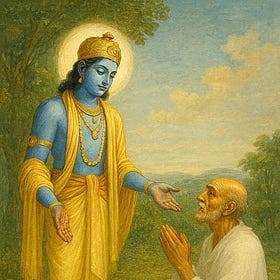Devotional service is the ultimate goal of life
Nārada is always fixed in thought of the Supreme Lord, and he wanted to pull the Pracetas in the same direction. With them, he could speak freely.
The Pracetas are very important in the narration of the Srimad Bhagavatam. Their meeting with Lord Śiva produced the song of Lord Śiva, one of the most important passages of the 4th canto. Similarly, their long meditation inside the water created the conditions for Nārada Muni to reveal the eternal nature of the soul in his talks to Prācīnabarhi. Later, they met Lord Viṣnu Himself, married Marisa, and fathered Daksa (in his second birth) and ruled as the kings of Bhū-Mandala. At the end of their lives, Nārada Muni appeared to them to deliver the final instructions that would lead them back home, back to Godhead.
In reality, the Pracetas achieved pure devotion to the Lord during their meditation inside the water, and this was confirmed by the Lord personally appearing to them. Devotional service can't ever be lost, but it can be covered for some time when one becomes involved in material activities, just like the brilliance of a diamond may appear to be diminished when it is covered by dust. The Pracetas spent a long time in family life, looking over state affairs, and thus their meditation on the Lord appeared to be less sharp than before. However, this is just a temporary situation. Just as a diamond can be easily dusted off and shine again, the devotion of the Pracetas was quickly sharpened by the words of Nārada Muni.
Nārada is certainly always fixed in thought of the Supreme Lord, and he wanted to pull the Pracetas in the same direction. With them, he could speak even more freely than with Prācīnabarhi, because the Pracetas were not only already pure devotees, but they had already renounced everything material and entered the last stage of life.
These instructions of Nārada Muni serve as a conclusion of all the teachings of the 4th canto, emphasizing our forgotten loving relationship with the Lord.
Nārada started by stating that devotional service is the only goal of life. When one comes to the devotional service to the Lord, his birth, activities, life span, mind and words become all perfect, since they are all utilized for this highest goal. However, if one does not actually engage in the service of the Lord, everything is useless. Even brāhminical activities are useless if they don't bring one to the service of the Lord. Even if one is a brāhmaṇa and is qualified with all the brāhminical qualifications, he is considered degraded if he is averse to worshiping the Supreme Lord. On the other hand, even if a person is born in a sinful family, one becomes qualified as a perfect brāhmana by simply chanting the holy names and following the regulative principles.
All the assets we obtain in life, such as the power of hearing and speaking, our intelligence, strength, and capacity of action, become meaningful only when we engage them in the service of the Lord; otherwise, they are all put to waste. One may be extraordinarily talented from a material point of view, but if these talents are not used in the service of the Lord, he is just like a vulture, that although capable of flying several kilometers high and possessing an extraordinary vision, uses these talents simply to find dead bodies on the ground to eat.
Even transcendental practices, such as the practice of mystic yoga, analytical study (Sankhya), practice of austerity, acceptance of sannyāsa, and the study of the Vedas, are ultimately useless if they do not ultimately help us realize the Supreme Personality of Godhead. Such practices can be useful only to the extent they elevate us to the platform of devotional service. Without at least a touch of devotional service, they cannot give the desired results.
The Lord is the source of all auspicious activities, and therefore, He is also the destination of all processes of self-realization, be it karma, jñāna, yoga, and bhakti. Any identity we may find in this material world, including that of a human or demigod, is illusory and temporary. Our real identity is eternally connected with the Lord, as an eternal soul, and the Lord is ātma-daḥ, the one who can give us back that original identity.
One could agree that devotional service is the ultimate goal of life, but still protest that there are other duties that need to be performed according to the Vedas, such as the worship of different demigods, ancestors, and so on. Nārada, however, countered that by stating that simply worshiping the Supreme Lord through the process of devotional service, one automatically satisfies the demigods and others, who are parts of that Supreme Personality, just as one nourishes the whole tree by giving water to the root, or the whole body by giving food to the stomach.
The worship of Krsna does not depend on the worship of any demigod, and similarly, bhakti does not depend on karma or jñāna to the successful. On the contrary, karma and jñāna require a mixture of bhakti to be successfully executed. Unless Krsna is brought into the center, no activity can produce any lasting beneficial result.
The idea of devotional service to the Lord being the only real goal of life becomes very natural when we understand that we are parts and parcels of the Lord, and therefore our natural position is to serve the Lord, just as all parts of the body serve the whole. Even while we declare our independence here in the material world, we continue to be connected to the Lord, and we continue to be maintained by Him. Factually, there is no existence separated from the Lord. To think we are separated or independent from Krsna is merely influence of illusion. When we come back to the service of Krsna, all of this is easily understood. Everything comes from the Lord, everything rests on His energy, and everything should be used in His service.
Nārada makes this point clear by offering several examples. The rain is ultimately generated by the sun through the process of evaporation, but the same rain that is given in the rainy season is taken away by the same sun during summer. Similarly, the bodies of all living entities come from the elements of the earth, and later they are decomposed back into the earth. In the same way, the whole material creation is produced from the Lord, and later merges back unto Him. Everything is owned by Him and is completely under His control.
The entire cosmic manifestation is just a display of Krsna’s energy, and is thus non-different from Him, just as sunshine is non-different from the sun. However, just as the sunshine is not the sun, the universe is not the Lord, as explained in the philosophy of acintya-bhedābheda-tattva of Śrī Caitanya Mahāprabhu. The Lord is simultaneously different and non-different from the cosmic manifestation.
The sunshine is part of the sun, yet being in the sunshine is not the same as being inside the sun. Similarly, the material creation rests on the brahmajyoti, the bodily rays of the Lord, and although the material world is part of the energy of the Lord, and although He is present everywhere, conditioned souls can't see Him directly, just as a common person may see the light of the sun, but not the demigod of the sun. When we come back to our original, pure consciousness, however, we can directly see the Lord.
In the same way, different meteorological conditions, such as rain and snow, day and night, appear due to the influence of the sun, but the sun itself is not affected by these manifestations. The Lord is unaffected by the material modes and other factors of material existence, even though He is the cause of all these manifestations. The Lord is thus the source of everything, and everything is under His control, yet He remains transcendental. The Lord is thus the permanent factor in all existence, the cause of all causes, the Supersoul of all living entities, who are themselves part of His energy. Understanding these points, we should engage in His devotional service, utilizing all our energy, thoughts, intelligence, processions, and other assets.
As Prabhupada concludes, "Those who are really conversant with this knowledge can utilize everything for the service of the Lord because nothing in this material world is unconnected with the Supreme Personality of Godhead."
Read also:
If the goal is devotional service, why do the Puranas promise material rewards?
The Brahma Vaivarta Purana offers great material benefits for one fasting on Ekādasī and performing other spiritual activities. According to it, fasting on Ekādasī offers liberation from all sins, health and long life, wealth, beauty, and happiness, and the blessing of having children. Similarly, the Padma Purana contains extensive sections glorifying the merits of performing pilgrimage, temple worship, chanting, and fasting on Ekādaśī, promising freedom from disease and poverty, birth in a rich or prestigious family, elevation to the celestial planets, and fulfillment of all material desires. Similar statements can also be found in other Puranas.
If you read this article to the end, give it a like. This makes Substack recommend it to more people.




l Thank You So Much Oh Afortunated Devotee Caitanya Chandra Dasa HARE KRSNA HARE RAMA HARIBOL JAl SRl HARI